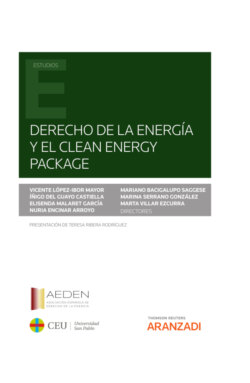Читать книгу Derecho de la energía y el clean energy package - Elisenda Malaret García - Страница 24
На сайте Литреса книга снята с продажи.
6. THE POLITICAL DECISIONS OF THE EUROPEAN COUNCIL IN THE PERIOD 2015-2019
ОглавлениеIn light of the considerable developments in the EU energy and climate policy since the beginning of 2015, especially the Paris Agreement (2015/2016), the Clean Energy for all Europeans legislative package/“4th package” (2016 to 2018) and the “European Green Deal” of the new Commission under Ursula von der Leyen (December 2019), the European Council adopted a number of important political decisions.
Accordingly, further to the presentation of the Commission Communication “A Clean Planet for all” of 28 November 201842, which is a European strategic long-term vision for a prosperous, modern, competitive and climate neutral economy and taking into account the outcome of COP24 in Katowice, the European Council of 13 and 14 December 2018 invited the Council to work on the elements outlined in the Communication. The European Council stated that it will provide guidance on the overall direction and political priorities in the first semester of 2019, to enable the European Union to submit a long-term strategy by 2020 in line with the Paris Agreement.
The European Council of 21 and 22 March 2019 reiterated its commitment to the Paris Agreement and recognized the need to step up the global efforts to tackle climate change. It also emphasized the importance of the EU submitting an ambitious long-term strategy by 2020 striving for climate neutrality in line with the Paris Agreement, while taking into account Member States’ specificities and the competitiveness of European industry. Moreover, it recognized that the implementation of the Paris Agreement objective offers significant opportunities and potential for economic growth, new jobs and technological development and for strengthening European competitiveness, which must be reaped while ensuring a just and socially balanced transition for all, and called on the Council to intensify its work on a long-term climate strategy ahead of a further discussion in the European Council in June 2019.
The European Council of 20 June 2019 emphasized the importance of the United Nations Secretary General’s Climate Action Summit in September 2019 for stepping up global climate action so as to achieve the objective of the Paris Agreement, including by pursuing efforts to limit the temperature increase to 1.5°C above pre-industrial levels.
Following the sectoral discussions held over at the beginning of 2019, the European Council invited the Council and the Commission to advance work on the conditions, the incentives and the enabling framework to be put in place so as to ensure a transition to a climate-neutral EU in line with the Paris Agreement that will preserve [a)] European competitiveness, [b)] be just and socially balanced, [c)] take account of Member States’ national circumstances and [d)] respect their right to decide on their own energy mix, while building on the measures already agreed to achieve the 2030 reduction target. In this context, the European Council [e)] invited the European Investment Bank to step up its activities in support of climate action.
The EU and its Member States remain committed to scaling up the mobilization of international climate finance from a wide variety of private and public sources and to working towards a timely, well-managed and successful replenishment process for the Green Climate Fund.
The European Council underlines EU leadership in tackling global warming and provides an important contribution to the EU’s long-term strategy of achieving carbon neutrality by 2050. Indeed, the European Union set itself, amongst others, firstly, the objective of increasing the share of renewable energy sources in the mix by 20% of gross final energy consumption for 2020, to 27%43 by 2030 and to 50%44 by 2050 by reducing, at the same time, the percentage of carbon (“decarbonisation”) and, secondly, by reducing greenhouse gas emissions.
The “Environment” Council conclusions of 26th June 2019 on the future of energy systems in the Energy Union to ensure the energy transition and the achievement of energy and climate objectives towards 2030 and beyond fall within the framework of the “Clean energy for all Europeans” package completed in May 2019 and the Commission’s Communication “A Clean planet for all”45 of 28.11.2018, which sets out a strategic vision for the EU’s future climate policy. They also recall the European Council conclusions on climate change of 13-14 December 2018, 21-22 March 2019 and 20 June 2019. The text of the conclusions was prepared by the Presidency based on a debate of energy ministers at an informal meeting in Bucharest on 2 April 2019. It was discussed extensively during several meetings of the Energy Working Party and in the Committee of Permanent Representatives on 12 June 2019.
The European Council of 12 December 2019, that took place one day after the Commission’s Communication on the “European Green Deal”, endorsed the objective of achieving a climate-neutral EU by 2050, in line with the objectives of the Paris Agreement. Achieving climate neutrality will however require overcoming serious challenges and the transition to climate neutrality will bring significant opportunities, such as potential for economic growth, for new business models and markets, for new jobs and technological development (point 1 and 2 of the conclusions). The European Council took note of the Commission’s Communication on the European Green Deal of 11 December 2019 and asked the Council to take work forward and put in place an enabling framework in order to ensure a cost-effective, just, as well as socially balanced and fair transition, taking into account different national circumstances in terms of starting points. The European Council acknowledged the need to ensure energy security and to respect the right of the Member States to decide on their energy mix and to choose the most appropriate technologies (point 6).
